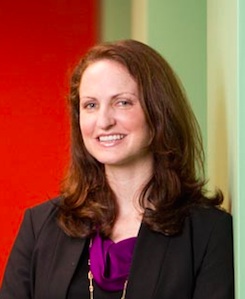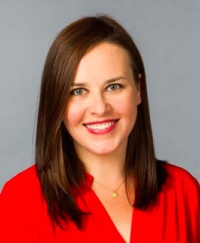
Get your FREE 30-day trial.
Please complete all fields.
At Salesforce, April is Women in Technology month — a time for us to celebrate female leaders everywhere, including our own awesome women right here at Salesforce. This month, we’ve lined up an impressive group of female leaders to offer insights (for men and women) on how to build a successful career in the tech industry. Read on for valuable tips and some interesting stories that may surprise you.
 Sarah Patterson
Sarah PattersonSenior VP, Product Marketing, Service Cloud
When I entered college, I was dead sure I wanted to be a doctor. A year later, after passing out from formaldehyde fumes during one biology class, I realized I needed to find a new future career.
Being an Econ major, I loved looking at how businesses worked. I wanted a job that was fast-paced where I could learn a lot quickly. When I started looking around at jobs I could get and industries that were exciting, I found an opportunity to do M&A for tech companies.
What I loved about banking was that I got to work with a wide variety of different companies in the tech sector, ranging from business intelligence companies to online dating companies. The industry was always innovating, and that made it an exciting place to be. You were continually challenged to learn about new technologies and how they changed the landscape for business.
After working in banking for a while, I wanted a job that would have a bigger impact on people’s lives. That’s when I moved to doing economic development for a nonprofit. I spent 18 months working with the City of Newark on workforce development programs and figuring out what clusters of business the city could invest in to create new jobs.
I loved the work and the impact I had on people’s lives but knew I wanted to get back into tech. I went to Stanford business school to be in the heart of Silicon Valley and it was there at a career fair on campus that I found Salesforce. What I loved about the company is that I have the opportunity to work in a fast-paced tech environment, but also work for a company that makes a difference in people’s lives, both through its technology and its foundation.
In July of 2013, I was asked to come over and run the Service Cloud Product Marketing team at Salesforce. When I came into the role I definitely felt overwhelmed. I had been at Salesforce for a while, but the world of customer service was completely new to me. I not only had to ramp up quickly on a new industry, but I also had to figure out how to grow and scale the business, enable sales, align the team with product management, and develop an industry-moving message… all with a team of just four people!
I knew I couldn’t figure this out on my own, so I started meeting with all of my key stakeholders across the business. They taught me about the business and helped me learn about our customers, from what a typical customer service reps workday is like to what challenges customer service managers face in their business. They not only helped me ramp on the business, but they also collaborated with me on the best way for us to work together to hit our goals.
The main thing I learned out of that experience was that there’s no substitute for good communication. You’ll face a lot of challenges in business and clear communication is crucial for figuring out the best path forward.
I see this advice as advice I’d give to anyone in any job, not just tech. For me, I wish I had pushed myself to find my voice faster, and this is something I tell to everyone I work with. Find a way to speak up in meetings. If you have insights or opinions on what’s going on, then express those.
But also don’t underestimate the power of just asking questions. There are so many meetings that I go into where asking questions helps unearth different viewpoints, new insights, or areas where people are misaligned. Questions are a powerful way to pull people into the process and help them have a voice in the discussion and feel ownership in the outcomes that are driven. And often asking questions is one of the most overlooked ways to participate in meetings, especially as you look to find your voice.
Also, don’t be afraid to say “I don’t know” — so many people feel insecure about not knowing something. I definitely did back earlier in my career. But there’s no way you can know everything about all situations. In fact, not knowing and coming into a situation with a fresh perspective can be extraordinarily helpful. Embrace it and ask questions to learn, you won’t be the only one in the room who ends up learning something!

Senior Director, Product Marketing, Analytics Cloud
Going to college in New York, I assumed that I had a choice of three career paths: finance, medicine, law. I'm not much for needles, and law school seemed like a big commitment at age 21, so I chose to work in finance: management consulting for financial institutions.
Consulting exposed me to how businesses work, and gave me the skills that I will always be grateful for: mouse-free Excel, (financial) modeling, perfectionism. But, despite the opportunities, I was not inspired by interest rates and risk rating models. So I did what many consultants do: I went to business school.
MIT Sloan is where I met my two career loves: technology and marketing. It had never occurred to me (shockingly, I know) that I could work to help build a product that solved problems and deliver that product to customers.
After an externship at a start-up, an internship at an established technology company, and countless conversations with alumni, one company stood out: Salesforce.
I joined Salesforce one month after graduating business school, as a product marketing manager. Best career move, yet.
The experiences that have been the most valuable are ones that have been with customers. Salesforce is in the business of making our customers successful, and customer success cannot be delivered in a vacuum.
One experience comes to mind: I had been at Salesforce for a little over three months, was still learning the ropes. My manager and I were going to be flying to Boston to deliver a presentation in front of ~300 customers. He would be presenting at a session, and I would be delivering the accompanying product demo.
The day before flying to Boston, he informed me that he would be unable to attend the event due to a family emergency. He asked that I take the lead on the presentation.
I panicked. What if I got something wrong? What if I looked stupid? What if I made a mistake, or flubbed a line?
After calming me down, my manager proceeded to inform me that my role at this event was not to have all of the answers (although it certainly helped that I had been doing deep dives into the content, material, and product for past three months). My role was to engage customers, get a sense of what was missing and which problems they needed to solve, and see if I could help solve them. My job was not to look cool on stage, but to create a meaningful dialogue.
Long story short, I presented at the session (shaking, sweaty palms), and got everything pretty much "right." But what counted was what happened at the Q&A. People didn't want to ask questions about my soliloquy; they wanted to share an experience, or get a solution to a problem. I didn't have every answer, but I took business cards and email addresses, following up to learn more.
Those relationships have been critical: to understanding the marketplace, understanding customers, and being able to understand how my product(s) can make a difference, or how my products can improve.
Three pieces of advice:
1) Be humble.
It is very rare to be right on the first try. Chances are, you're in the neighborhood, but still a few doors away. Keep this in mind, especially as you get more experienced. Listen to people's opinions with an open mind, read into suggestions and ask questions to clarify. Take advice from everyone, at every level.
2) Learn more about different roles, different people.
I am always surprised by the incredible things that people are taking on, and the interesting ways that they are choosing to tackle challenges. The more I engage new people, the more I can find new ways to evolve my own career.
3) Be transparent.
If you are working in technology, you are invariably a part of a team. It is better to show your work at 25%, 50%, and 75% to get feedback and demonstrate progress than it is to hoard your deliverables until they are complete.

Principal Architect, Quality Engineering
Let's start from the very beginning. During a summer break in my high school years, I attended an introductory computer science course in the local YMCA. The two-week course covered the world of computers, binary numbers and BASIC language. Yes, it was a long time ago. This course inspired me to do a computer science engineering degree. I was offered a software engineering job straight after my undergraduate program and that's how I got into the tech industry.
My first job was to build an application to manage the company's data around the SEI-CMM processes. Our manager asked us to build the application with Java and backed with an object-oriented database. Java was a fairly new programming language at that time. That was a great experience as we ended up presenting our project at a Java One conference.
I worked as a consultant for three years. This gave me the opportunity to work with multiple customers and multiple technologies. Every project would be with a new technology vendor but primarily in the J2EE space. I would worry at the start of every project that I don't know the new technology. I was able to pick up the technology and implement the solution. That's when I realized that the tech industry will continuously rollout new technologies to solve new types of problems and constant learning is the key to success. This mindset has helped me work on multiple projects at Salesforce across the software and infrastructure domains.
I would probably tell myself to constantly surround yourself with great engineers and managers who will push you beyond what you think you are capable of. If you aren't feeling challenged, then you probably aren't learning and improving your skill sets.